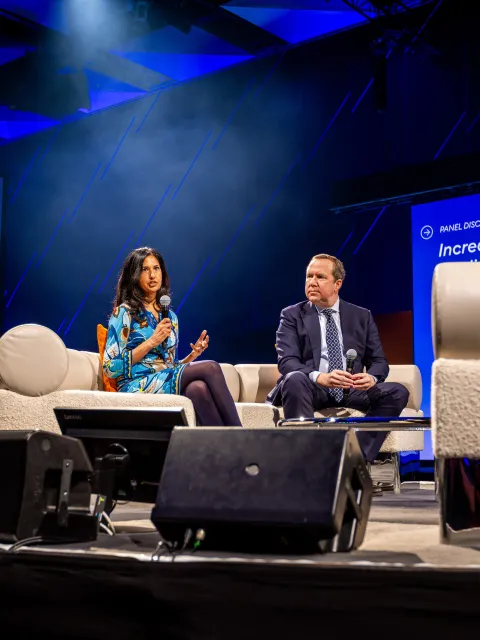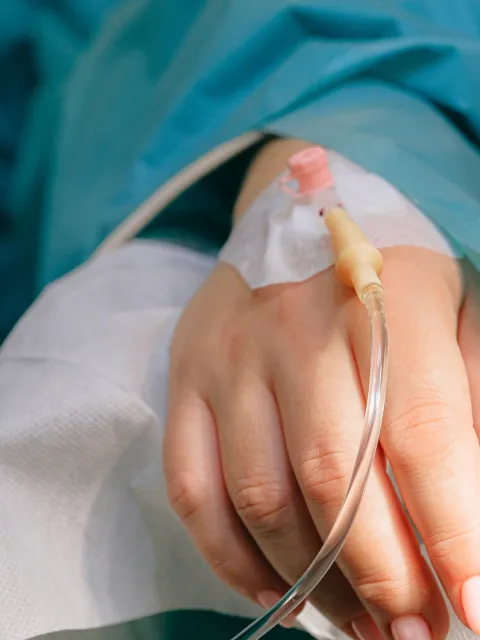Updated list of essential medicines includes two new cancer medicines – more equitable access still needed
This week, the World Health Organization (WHO) released its 23rd Model List of Essential Medicines (WHO EML). UICC and the ATOM Coalition are encouraged to see that it now includes the addition of two new cancer medicines, but there is still a need to significantly improve access in low- and middle-income countries.

HIGHLIGHTS
-
The Model List of Essential Medicines (WHO EML), updated every two years, assists countries in meeting their healthcare needs; the latest 23rd edition includes two new cancer medicines
-
Despite the expansion of the WHO EML from 208 to 502 medicines since its introduction in 1977, access to these essential treatments remains a challenge, particularly in low- and middle-income countries, highlighting the need for concerted global efforts to bridge this gap
-
The Access to Oncology Medicines (ATOM) Coalition, initiated by UICC, addresses the issue of inadequate access to lifesaving medicines in low- and lower-middle-income countries through various strategies, including voluntary licensing mechanisms.
Revised every two years by a multidisciplinary expert committee, the Model List of Essential Medicines (WHO EML) is a critical guide prioritising “effective, safe and ideally cost-effective” medicines, which helps each country develop its own national essential medicines list (NEML) to meet its population’s healthcare needs and address its specific disease burden.
Over the years, UICC has been closely involved in the review of cancer medicines on the WHO EML, including convening experts for a comprehensive review of the cancer section in 2015. It has also supported WHO in the development of proposals for several cancer-related additions, including for zoledronic acid, erlotinib (with gefitinib and afatinib available as alternatives), dasatinib and nilotinib.
UICC is pleased to see that the 23rd WHO EML released by WHO on 26 July includes the addition of two new cancer medicines. However, many of the patented medicines resubmitted for inclusion this year were not added to the list, mainly due to concerns over affordability and the strain they would cause health systems.
The 9th version of the EMLc, the essential medicines list for children, was also released, where the expert committee also recommended expanded indications for several medicines already listed, notably for anaplastic large cell lymphoma, Langerhans cell histiocytosis and Burkitt lymphoma.
Two new cancer medicines in the 23rd WHO EML and 9th EMLc
1. Pegylated liposomal doxorubicin for the treatment of Kaposi sarcoma.
2. Pegfilgrastim to stimulate the production of white blood cells and reduce the toxic effect of some cancer medicines on the bone marrow.
Need for greater access in low- and middle-income countries
The total number of medicines on the WHO EML is now 502 (and 361 for the EMLc), which is more than double from a list of 208 in 1977, reflecting advances in drug development and the growing public health needs. Yet the reality is that access to these medicines continues to be inadequate, particularly in low- and middle-income countries (LMICs).
“We recognise that lifesaving cancer medicines are not always reaching those who need them. Many LMICs continue to lack consistent, timely and affordable access to quality-assured cancer medicines for a whole range of reasons, from a lack of access to companion diagnostics to financial and regulatory barriers.”
– Dr Sonali Johnson, Head of Knowledge, Advocacy and Policy, UICC
Recognising the urgency for coordinated and concerted action to address the disparity, UICC launched the Access to Oncology Medicines (ATOM) Coalition in May 2022 to ensure lifesaving medicines are within reach for all.
The ATOM Coalition leverages the collective strengths and expertise of over 40 partners across the public, private and civil society sectors to directly address these access barriers. Working directly with governments and key stakeholders in low- and lower-middle-income countries (LLMICs), the ATOM Coalition will support countries to develop sustainable and scalable access solutions that complement and strengthen existing local access programmes, as well as leverage innovative access mechanisms to maximise reach and impact.
As part of its range of actions, UICC and the ATOM Coalition supported Amgen in its application for pegfilgrastim to be included in the latest review of the WHO EML. Pegfilgrastim aids in treating neutropenia, a condition characterised by an abnormally low concentration of neutrophils, a type of white blood cell. This results in a compromised immune system and is often a side effect of cancer treatments such as chemotherapy.
"While Amgen celebrates the addition of new medicines for cancer care, including pegfilgrastim, in the latest WHO EML and EMLc, we do not lose sight of the fact that less than 50% of these essential medicines are available to people living with cancer in LMICs. As a partner of the Asia Pacific Oncology Alliance, UICC and the ATOM Coalition, Amgen is committed to working with countries, including ATOM Coalition target countries, to close the access gap.”
– Prof. Victoria Elegant, Vice President, Access to Healthcare, Amgen
Complementary measures to ensure greater access to medicines on the WHO EML, such as voluntary licensing mechanisms, pooled procurement and capacity development, will be key. This past October, the ATOM Coalition facilitated the first-ever public health-oriented voluntary license (VL) agreement for a cancer medicine. Subsequently, four manufacturers have signed sublicense agreements with the Medicines Patent Pool (MPP) to produce generic versions of Novartis’ nilotinib, an oral treatment for chronic myeloid leukemia (CML) which is listed on the WHO EML.
“Applying the WHO EML as a model to update NEMLs is the first step towards improved accessibility and availability of cancer medicines, particularly in low- and middle-income countries, which often face limited health budgets and the capacity to review new medicines. That’s why the ATOM Coalition has established a target list of priority generic, biosimilar, and patented medicines based on the WHO EML that it will initially focus on.”
– Dr Zeba Aziz, Member, WHO EML Expert Committee and ATOM Coalition Medicines Expert Advisory Group
Last update
Thursday 27 July 2023
